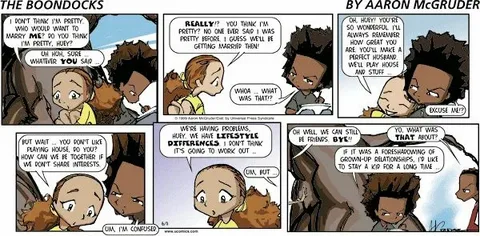Table of Contents
Introduction
“The Boondocks” is an animated series that captivates audiences with its bold storytelling and sharp social commentary. Created by Aaron McGruder, the show explores themes of race, politics, and culture with unapologetic humor. With its unique animation style and thought-provoking narratives, “The Boondocks” stands out as a revolutionary series. This article delves into the show’s impact, its compelling characters, and why it remains relevant today.
The Origins of “The Boondocks”
“The Boondocks” began as a comic strip in 1996, created by McGruder while he was in college. It gained popularity quickly, featuring the lives of two African-American brothers who move to a predominantly white suburb. The comic strip’s success paved the way for the animated series, which premiered on Adult Swim in 2005. The show retained the comic strip’s edgy humor and willingness to tackle controversial topics, drawing in a diverse audience.
The Show’s Unique Animation Style
The animation of “The Boondocks” blends anime influences with traditional American cartoon aesthetics, creating a distinct visual experience. Characters are drawn with exaggerated expressions, highlighting their emotions and enhancing comedic moments. The fluidity of the action scenes adds a cinematic quality rarely seen in Western animation. This blend of styles helps “The Boondocks” stand apart, appealing to both anime fans and traditional cartoon viewers alike.

Characters that Define “The Boondocks”
The characters in “The Boondocks” are central to its storytelling, each one bringing a unique perspective. Huey Freeman, the ten-year-old revolutionary, serves as the voice of reason and often questions societal norms. His younger brother, Riley, represents the rebellious side of youth culture, obsessed with hip-hop and street life. Their grandfather, Robert Freeman, provides comic relief while also embodying the challenges of raising two young boys. Each character’s dynamics create a rich tapestry that reflects real-world complexities.
Tackling Social Issues with Boldness
One of the defining traits of “The Boondocks” is its fearless approach to addressing social issues. From racism and police brutality to celebrity culture and political hypocrisy, the show pulls no punches. Episodes often spark debates, forcing viewers to confront uncomfortable truths about society. This approach keeps the show relevant, resonating with audiences long after episodes air. The show’s boldness is a reminder of the power of art to provoke thought and inspire change.
The Impact of Satire in “The Boondocks”
“The Boondocks” masterfully uses satire to critique societal flaws, blending humor with harsh realities. Episodes like “Return of the King,” which imagines Martin Luther King Jr.’s reaction to modern America, showcase the series’ brilliance. The satire is sharp, often pushing boundaries to emphasize its points. This approach allows “The Boondocks” to comment on sensitive topics without losing its comedic edge. By holding a mirror to society, the show challenges viewers to rethink their own beliefs.
Controversies Surrounding the Series

With its unfiltered commentary, “The Boondocks” has not been without controversy, often stirring strong reactions from various groups. Some episodes were pulled from air due to their content, deemed too provocative by networks. However, these controversies only added to the show’s allure, drawing in viewers curious about its boundary-pushing narratives. The willingness to tackle taboo topics has cemented “The Boondocks” as a series that refuses to be silenced.
Legacy and Cultural Impact
“The Boondocks” left a lasting impact on both the animation industry and pop culture at large. It opened doors for more mature animated series that tackle serious issues, proving that cartoons aren’t just for kids. The show’s quotes, characters, and episodes are often referenced in discussions about race, politics, and social justice. Even years after its final episode, “The Boondocks” continues to influence new generations of creators and audiences alike.
Why “The Boondocks” Remains Relevant
The themes explored in “The Boondocks” remain relevant today, reflecting ongoing societal struggles and triumphs. Its commentary on racism, cultural appropriation, and political hypocrisy resonates deeply in the current social climate. With the rise of social media, the show’s critiques have become even more poignant, highlighting issues that are often amplified online. This relevance keeps “The Boondocks” fresh in the minds of those who crave insightful and unapologetic storytelling.
Conclusion
“The Boondocks” stands as a groundbreaking series that challenges, entertains, and provokes thought in equal measure. Its unique blend of animation, sharp satire, and compelling characters make it a standout in the world of television. By tackling real-world issues with humor and honesty, “The Boondocks” has earned its place as a cultural touchstone. The show’s legacy serves as a reminder of the power of storytelling to reflect society’s complexities and inspire change.

